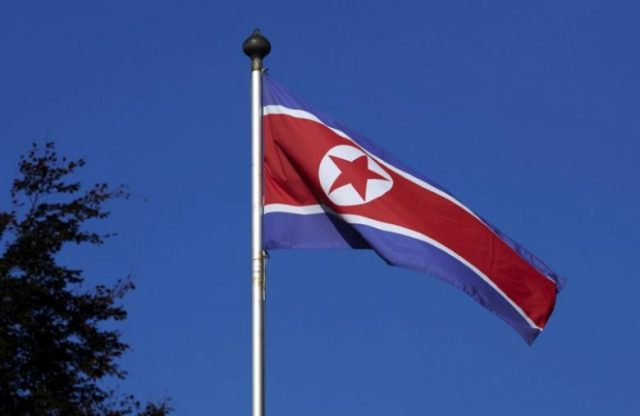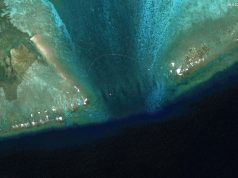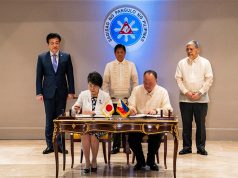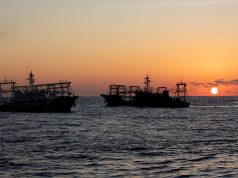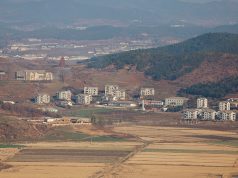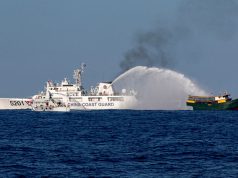TOKYO/BEIJING — Japan will impose additional sanctions on North Korea following repeated threats by Pyongyang’s missiles and nuclear program, Japan’s top government spokesman said on Friday.
Chief Cabinet Secretary Yoshihide Suga told a news conference that Japan would freeze assets of 19 more North Korean institutions.
Suga’s disclosure came after China’s President Xi Jinping said the crisis over North Korea’s weapons programs must be resolved through talks, not war, while U.N. Secretary-General Antonio Guterres warned of the danger of “sleepwalking” into conflict.
Xi made his comments to visiting South Korean President Moon Jae-in after U.S. Secretary of State Rex Tillerson offered on Tuesday to begin direct talks with North Korea without pre-conditions.
But the White House said on Wednesday that no negotiations could be held until North Korea improved its behavior.
Russian President Vladimir Putin said Tillerson’s offer of direct contacts with North Korea was “a very good signal” while warning that any U.S. strike on the country would have catastrophic consequences.
Putin and U.S. President Donald Trump discussed North Korea during a phone call, the White House and Kremlin said in separate statements. The two leaders talked about “working together to resolve the very dangerous situation,” the White House said on Thursday.
Tillerson is to attend a U.N. Security Council ministerial meeting on North Korea in New York on Friday at which he plans to urge countries to maintain a U.S.-led campaign to pressure Pyongyang to abandon its weapons programs through sanctions.
North Korea tested its most advanced intercontinental ballistic missile on November 29, which it said could put all of the United States within range, in defiance of international pressure and U.N. sanctions.
The United States has said all options were on the table in dealing with North Korea, including military action.
Meeting in Beijing’s Great Hall of the People, Xi told Moon the goal of denuclearizing the Korean peninsula must be stuck to, and war and chaos cannot be allowed, Chinese state media said.
“The peninsula issue must, in the end, be resolved via dialogue and consultation,” Xi was cited as saying.
China and South Korea have an important shared interest in maintaining peace, and China was willing to work with South Korea to promote talks and support North and South to improve relations, Xi said.
South Korea’s Yonhap news agency said Xi and Moon agreed war on the peninsula would not be tolerated and they would cooperate in applying sanctions and pressure on North Korea.
The apparently warm tone of their talks followed nearly a year of tense relations between the two countries.
THAAD issue
China has been furious about the deployment of the U.S.-made Terminal High Altitude Area Defense anti-missile system in South Korea, saying its powerful radar can see far into China.
China and South Korea agreed in October to normalize exchanges and move past the dispute, which froze trade and business exchanges.
Xi reiterated China’s position on THAAD and said he hoped South Korea would continue to “appropriately handle” the issue.
Guterres, speaking to reporters in Tokyo after meeting Japanese Prime Minister Shinzo Abe, said Security Council resolutions on North Korea’s nuclear and missile programs must be fully implemented by Pyongyang and other countries.
He said he expected Friday’s Security Council meeting would deliver a strong expression of unity and the need for diplomacy to resolve the issue.
“The worst possible thing that could happen is for us all to sleepwalk into a war,” he said.
British Foreign Secretary Boris Johnson said after meeting Japanese Foreign Minister Taro Kono in London on Thursday that military options in North Korea did not look attractive and the best way forward was to intensify economic pressure.
Both China and Russia have welcomed Tillerson’s apparent overture.
Putin said a U.S. strike on North Korea would have catastrophic consequences and that he hoped to work with Washington eventually to resolve the crisis.
Putin told a news conference that Russia did not accept North Korea’s nuclear status, but some U.S. actions had provoked North Korea.
“We believe the two sides should now stop aggravating the situation,” he said.
North Korea justifies its weapons programs as necessary defense against U.S. plans to invade. The United States, which has 28,500 troops in South Korea, a legacy of the 1950-53 Korean war, denies any such intention.
North Korea’s state news agency KCNA said Trump was taking a big step towards nuclear war in seeking a naval blockade and North Korea would take “merciless self-defense” measures if the United States tried to impose one.
North Korea would regard a naval blockade as “an act of war” and a “wanton violation” of its sovereignty and dignity, the agency cited a Foreign Ministry spokesman as saying, while reiterating that North Korea was a responsible nuclear power that would fulfil its non proliferation commitments.
It was not immediately clear if the latter remark was a response to Tillerson’s statement this week that Washington could not accept Pyongyang as a nuclear power as it was a proliferation risk.
Washington has not publicly called for a blockade of North Korea, but has sought tougher U.N. steps, including non-consensual inspections of shipping to North Korea.
Stepped-up U.N. Security Council sanctions imposed in September after North Korea’s sixth nuclear test called on states to inspect vessels on the high seas, with the consent of the flag state, if they had reasonable grounds to believe the ships were carrying prohibited cargo.
A tougher U.S.-drafted resolution was watered down to win the support of Russia and China.

